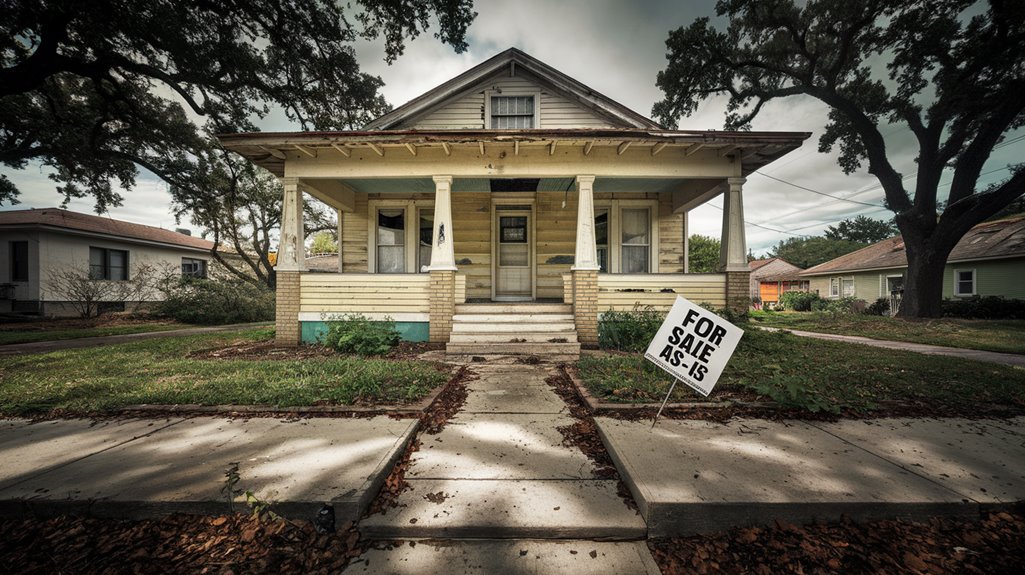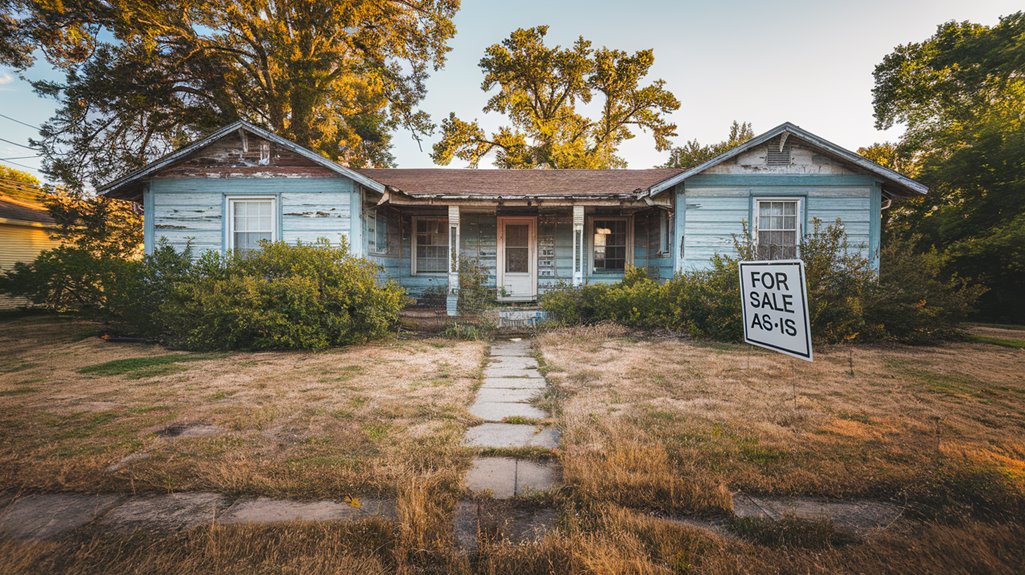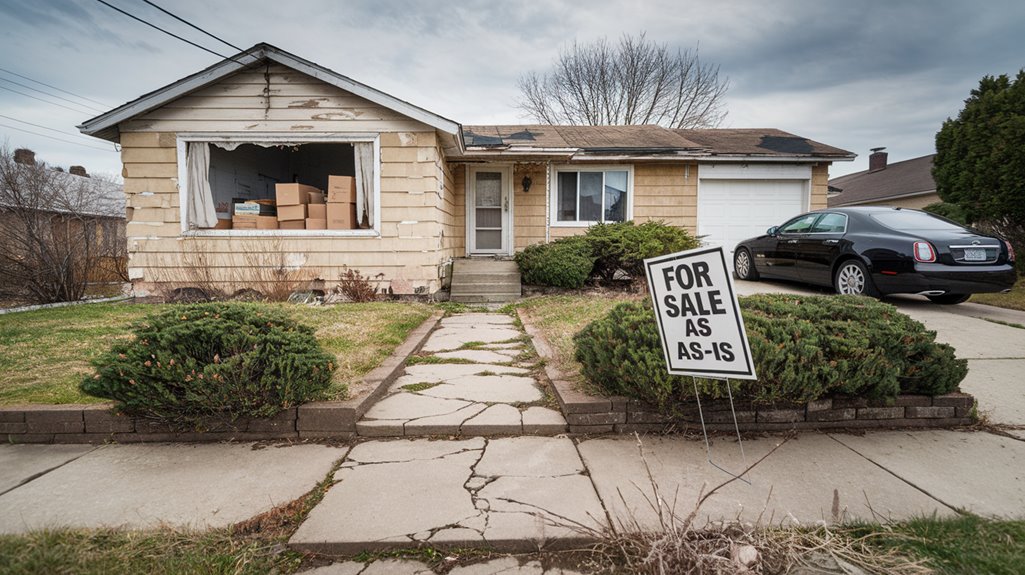Home repairs can become a major burden during the traditional home selling process. Many sellers face unexpected repair demands, derailing their timeline and budget. Studies show that nearly 40% of homeowners encounter this frustrating situation.
If you’re dealing with repair issues, you might feel trapped between costly renovations and reduced sale prices. These unexpected expenses can drain your savings and delay your move. While selling traditionally seems daunting, there’s a simpler solution.
Selling your house “as-is” eliminates repair obligations and streamlines the entire sales process. This approach attracts specific buyers, saves time, and can offer better returns when handled correctly.
This guide will walk you through the essential steps of selling your house as-is, ensuring a smoother transaction.
Key Takeaways
- Selling as-is means the property transfers without repairs, resulting in faster sales and lower prices but attracting primarily investors and contractors.
- Obtain a professional inspection and prepare detailed disclosure documents to maintain transparency and prevent future legal disputes.
- Price the property competitively by analyzing recent sales data of similar distressed homes in your local market.
- Target cash buyers and real estate investors for quick closings within 7-14 days without traditional financing complications.
- Document all known issues, maintenance history, and repair estimates in a digital folder for potential buyers’ review.
What Does Selling a House “As-Is” Mean?

Selling a house “as-is” means offering your property without making any repairs or improvements. You accept the property’s current state when buying an “as-is” home. If you choose this option, you must handle all repairs after the purchase.
This type of sale benefits sellers who want a quick, straightforward transaction. We often see investors and renovation experts showing interest in these properties.
While buyers can request home inspections, they cannot ask sellers to fix issues. The price is usually lower because buyers take on repair responsibilities. You should understand that the seller won’t negotiate on property conditions. So, if major problems emerge during inspection, the buyer must accept them.
This approach works well for sellers who need to move quickly or avoid repair costs. If you’re considering an as-is purchase, you must have funds ready for future repairs. The sale process follows standard steps, but the terms remain firm about conditions.
Why Choose to Sell Your House “As-Is”?
You’ll find that selling your house “as-is” makes sense when facing financial constraints that prevent investing in repairs or improvements. If you’re under time pressure due to relocation, divorce, or foreclosure, an as-is sale can expedite the process by eliminating repair negotiations and renovation delays.
Inherited properties often benefit from as-is sales, particularly when you lack detailed knowledge of the home’s condition or want to quickly settle an estate.
Financial Constraints
Financial constraints lead many homeowners to sell their properties without making repairs. You can avoid costly repair expenses by choosing an as-is home sale option. This solution works best when repair costs would exceed your available budget. Since major home repairs can be expensive, selling as-is helps protect your finances.
We often see foundation repairs ranging from $4,000 to $10,000 in total costs. A new roof might cost between $8,000 and $20,000 for complete replacement. The HVAC system repairs typically run from $5,000 to $12,000 in most cases.
If you sell your house in its current state, you won’t need these substantial investments. This approach attracts buyers who specifically look for fixer-upper properties. They will handle all repairs while offering you a lower purchase price.
Time Sensitivity
Time sensitivity often forces property owners to consider selling their homes in as-is condition. You can close deals faster when selling a house without making repairs or improvements. When life events like divorces or job changes happen, sellers need quick solutions. Studies reveal that as-is sales complete 30% quicker than regular home sales.
This selling method helps you avoid lengthy repair discussions with potential buyers. You won’t need to wait for multiple contractors to provide estimates. Since there’s no need for staging, you can list your property immediately.
If you choose an as-is sale, you’ll maintain better control over your selling timeline. While this approach attracts motivated buyers, transparency about property issues remains essential. We recommend disclosing known problems to protect your legal interests during negotiations.
So, you can save valuable time by skipping repairs and extensive property preparations. When time is critical, an as-is sale offers the fastest path to closing.
This approach reduces back-and-forth communications about inspection findings with buyers. You will benefit from a streamlined process that fits urgent timeline requirements.
Inherited Properties
Selling inherited properties through as-is sales offers a straightforward solution for many heirs. You will face several challenges when dealing with an inherited home. The property might need major repairs or updates. It could be located far from your current home. These homes often carry deep emotional attachments for family members.
If you choose an as-is sale, you won’t need to manage complex renovations. This approach works well while handling other estate matters. Many inherited homes haven’t seen updates in years. You must still tell buyers about known problems with the house.
When you sell as-is, investors often become interested buyers. They have experience with outdated properties and estate sales. These buyers can handle major repairs and renovations themselves. If the home needs extensive work, investors might offer the best solution.
This method reduces stress during an already difficult time. It allows you to move forward without spending money on updates. You can focus on settling the estate while selling the property quickly.
What Are the Pros and Cons of Selling “As-Is”?
When you’re considering selling your house as-is, you’ll need to weigh significant tradeoffs between speed and convenience versus potentially lower sale prices. You’ll save time and money upfront by avoiding repairs and renovations, while simplifying the negotiation process with clear buyer expectations.
However, you’re likely to face a smaller pool of interested buyers and receive offers that reflect the cost of needed repairs, which can reduce your final proceeds compared to a fully renovated sale.
Pros
The speed of selling your house “as-is” can significantly reduce your time-to-close, as you’ll skip weeks or months of repairs and renovation work. You’ll save thousands in repair costs since you won’t need to fix major issues like roofing problems, HVAC replacements, or structural concerns.
By avoiding both the time and expense of improvements, you can move forward with your life more quickly while keeping more money in your pocket.
Speed of Sale
Speed of Sale means completing a property transaction quickly without prolonged waiting periods. You can sell your house faster by choosing an as-is sale option. This approach skips the lengthy repair and renovation processes.
If you decide to renovate, it will add weeks or months to your timeline. We understand that home repairs often face delays due to contractor schedules. You might also encounter issues with material shortages and permit approvals.
Since as-is sales attract investors and cash buyers, the closing process becomes simpler. These buyers typically make quick decisions and complete transactions faster. If you need to move quickly, this option will save significant time.
So, you can bypass the typical renovation steps and move straight to listing. This direct approach helps avoid ongoing expenses like mortgage payments and utilities. You will also save money on repair costs and contractor fees.
When time is crucial, an as-is sale offers the most efficient path. This method eliminates the usual delays and complications of traditional home sales.
Cost Savings
Cost savings are immediate when you choose to sell your house as-is. You will save between $5,000 to $50,000 by avoiding repairs and renovations. This approach eliminates the need for expensive contractor fees and building materials.
If you decide to sell as-is, you won’t spend money on cosmetic improvements or staging. While disclosure requirements still apply, you can skip costly property updates. So, your financial burden decreases significantly with an as-is sale.
Cons
When selling your house as-is, you’ll likely receive lower offers since buyers factor in the cost of repairs and improvements they’ll need to make.
Your potential buyer pool becomes significantly limited, as many traditional homebuyers prefer move-in ready properties and some lenders won’t finance homes needing substantial repairs.
These limitations often result in your home spending more time on the market, which can impact your bottom line and selling timeline.
Lower Sale Price
A lower sale price is inevitable when selling your home in as-is condition. You will receive offers that are 10-20% below market value. This price reduction occurs because buyers must consider several additional expenses.
We understand that buyers need to calculate repair costs into their purchase offer. If buyers choose an as-is property, they must budget for immediate repairs and renovations. The insurance companies often charge higher premiums for homes needing significant repairs.
Since buyers face uncertainty with as-is properties, they include a contingency budget. You should expect limited financing options for these properties. This situation reduces your potential buyer pool significantly.
Limited Buyer Pool
You will face challenges selling an as-is property due to its restricted market appeal. Investors and contractors typically make up most potential buyers for such properties. Traditional homebuyers often avoid properties that need major repairs or renovations.
This situation can lead to longer selling periods in the market. If you price your property competitively, you might attract more potential buyers. The selling timeline could extend by one to two months beyond normal expectations.
Your property value may decrease by up to 20% compared to well-maintained homes. We often see investors looking for bargains in the as-is property market. So, you should adjust your expectations regarding the final selling price.
How Can You Effectively Market an “As-Is” Property?

When marketing an as-is property, you’ll need to start with precise pricing that reflects both your local market conditions and the property’s current condition.
Your listing description should clearly communicate known issues while highlighting the property’s powerful value and unique features that could attract investors or renovation-minded buyers.
You can maximize your reach by targeting specific buyer segments through specialized marketing channels, including investor networks, real estate investment groups, and renovation-focused social media platforms.
Accurate Pricing
Accurate pricing calculations depend on three key factors when selling a property as-is. You must study recent sales data from similar distressed homes in your area. This helps establish a baseline price point for your property.
A professional home appraisal will give you clear insights into local market values. You can get multiple contractor estimates to understand the total repair costs.
If you research carefully, the market data will show pricing trends within a one-mile radius. We recommend looking at properties sold in the past three months.
Current market conditions affect how quickly homes sell in your neighborhood. The days-on-market statistics help determine realistic pricing expectations.
Your final price should reflect both repair costs and local market competition. When buyers see as-is properties, they expect a 10-15% discount from market value.
So, this data-driven method ensures you set competitive yet profitable prices. It attracts serious buyers while protecting your investment returns. If you follow these pricing guidelines, you will find the right balance between value and marketability.
Transparent Listings
You must provide clear information when selling a property as-is to attract serious buyers. This means the house will transfer without repairs or updates to its current state.
We recommend including all disclosure details at the start of your listing description. If you have a home inspection report, it should be part of your listing information. This open approach helps match suitable buyers with your property.
It will be beneficial to focus on the property’s strong points rather than its flaws. The listing should highlight key features like prime location and spacious lots. While some buyers avoid fixer-uppers, investors actively search for such opportunities.
If you showcase renovation possibilities, more potential buyers will show interest. So, your honest marketing approach will connect with renovation-minded buyers and investors. Since these buyers understand property potential, they often see value where others don’t.
Targeted Audience
Targeted buyers play a crucial role in selling as-is properties successfully. You must connect with people who understand fixer-upper properties and have funds for repairs. The primary target groups include:
Real estate investors want properties they can flip for quick profits. Construction experts seek projects that offer high-profit margins after renovations.
First-time homebuyers might choose as-is homes to save money. Cash buyers can close deals quickly without waiting for bank approvals.
If you work with experienced agents, they will help reach qualified buyers. These agents maintain networks of investors who actively seek distressed properties.
When you find the right buyers, your as-is property will sell faster. So, the success of your sale depends on reaching these specific buyer segments.
This targeted approach helps match properties with buyers who see their potential. Since specialized agents know the market, they can position your property effectively.
How to Sell a House “As-Is”
You’ll need to approach selling your house as-is with a clear strategy that includes understanding your local market, setting a competitive price point, and being completely transparent about the property’s condition.
When marketing an as-is property, target investors and renovation-ready buyers who appreciate the opportunity to customize a home to their specifications while accepting its current state.
Your success depends on simplifying the transaction process by having all disclosures ready, setting realistic expectations upfront, and working with professionals who understand as-is sales dynamics.
Understand the Market & Set Realistic Expectations
Understanding your local real estate market helps you set the right price for your as-is property. You need to check recent sales data in your neighborhood. This information will guide your pricing strategy. If the market favors sellers, you could get higher prices despite repair needs.
We recommend getting a professional home inspection first. This step will reveal all property issues clearly. You should use this report to set an accurate price point.
It is essential to study similar as-is homes that sold recently. Your agent can help find these comparable properties. These sales figures will show what buyers are willing to pay.
When setting your price, consider the repair costs carefully. This calculation will help justify your asking price to potential buyers. If major repairs exist, buyers will expect a lower price.
You must prepare clear disclosure documents about property conditions. This transparency builds trust with interested buyers. So, honest communication leads to better deals.
The market conditions will affect how buyers view your property’s issues. If buyers have limited options, they might accept more repairs. But your price should still reflect the home’s current condition.
Disclose Property Condition Honestly
Property condition disclosure requires sellers to share information about known defects in an as-is sale. You must follow legal requirements to disclose all property issues to potential buyers.
We need to create a complete list of property defects with proper documentation. If you hide any issues, buyers will likely find them during home inspections. This disclosure helps build trust with interested buyers and protects you legally.
You should include structural problems, water damage, and mechanical issues in your disclosure document. When you have repair records and photos, add them to support your disclosure statements.
So, transparent sellers often complete sales faster than those who hide property problems. If buyers discover undisclosed issues later, you might face legal troubles after the sale.
Since proper documentation matters, collect all repair records and maintenance history. Hence, a well-documented disclosure shows your honesty and commitment to a fair deal.
We recommend working with a real estate professional to ensure complete disclosure compliance. You will avoid future disputes by being honest about your property’s condition from the start.
Price the House Competitively
Competitive pricing requires a careful analysis of three main factors in an as-is home sale. You must understand current market trends before setting your price. The repair costs will directly affect how buyers view your property’s value.
We recommend getting a professional inspection to determine exact repair needs. This inspection will help you calculate the total renovation expenses. Comparable properties in your area will guide you toward the right price point.
If you research similar as-is sales, you will find the ideal price range. Market conditions play a crucial role in determining your final asking price. You should assess whether it’s a buyer’s or seller’s market.
Legal issues can impact your property’s marketability and final value. When you price too high, buyers may lose interest quickly.
Strategic pricing attracts serious investors who are ready to make offers. Your final price must reflect both local trends and property condition. If buyers see value in your price, they will respond with strong offers.
Target the Right Buyers
Successful as-is property sales depend on finding buyers who appreciate properties without improvements. You should connect with real estate investors who understand the value of such properties. These experts can quickly spot potential in properties needing renovations.
If you market through investment networks, you will reach the right audience. Real estate clubs and investor groups are perfect places to find interested buyers. You can also work with agents specializing in as-is property transactions.
When presenting your property, focus on elements that matter to investors. The location and lot size will greatly influence their decision-making process. This approach helps investors see future possibilities in the property. You should highlight unique features that could increase value after renovations.
We recommend emphasizing zoning flexibility and neighborhood comparable values. So, investors can better calculate their potential returns. If the property has distinctive characteristics, these could become selling points after improvements.
Simplify the Selling Process
Simplifying the selling process starts with proper planning and clear terms for an as-is house sale. You need to set clear expectations about the property’s condition from the start. This approach will help prevent legal problems later.
We recommend creating a detailed list of known issues before listing. If buyers understand the property’s condition, they will adjust their offers accordingly.
A digital folder should contain all important documents and repair estimates. So, when buyers request information, you can share it quickly. Your agent will help you price the house based on its current state. This strategy attracts serious buyers who accept the property as-is.
When you prepare a property disclosure statement, be honest about existing problems. You must include inspection reports and maintenance records in your documentation. If the price reflects the home’s condition, negotiations will move faster.
The listing agreement should clearly state the as-is terms of sale. We suggest establishing firm rules about repairs before showing the property. Your agent can create marketing materials that highlight the as-is nature. Hence, buyers will know exactly what to expect during the transaction.
Options for Selling a House As-Is

When selling your house as-is, you’ll find five primary options in today’s market: selling to cash buyers for quick closings, listing traditionally through a real estate agent, working with professional investors seeking renovation projects, pursuing auction sales for competitive bidding, or exploring iBuyer platforms for algorithmic offers.
Each path offers distinct advantages based on your timeline, property condition, and financial goals. Your local market conditions and property characteristics will help determine which option maximizes your return while meeting your specific needs.
Sell to a Cash Home Buyer
Cash home buyers offer a quick solution for selling properties without traditional real estate hassles. You can close the sale within 7-14 days through cash buyers. These investors focus on purchasing distressed properties in their current condition. If you choose this option, you won’t need to pay agent commissions.
This selling method eliminates typical closing costs and property repairs. You can skip the staging and showing process entirely. When you work with cash buyers, your property will receive a guaranteed offer.
The paperwork is minimal, and the process moves quickly. While cash offers range between 60-80% of market value, this option has clear benefits. If your property needs major repairs, cash buyers might be your best choice.
You will save time and avoid the complexities of traditional home sales. This option works well for homeowners who need to sell quickly. Hence, cash buyers provide a practical solution for properties that need immediate sale.
List on the Open Market
The open market provides a traditional path to sell your as-is property through a licensed agent. You can reach more potential buyers when listing on the Multiple Listing Service (MLS). This approach often brings higher profits despite taking more time than cash sales.
Your real estate agent will analyze local market data to set the right price. They will also manage the marketing, showings, and buyer negotiations. If you choose this route, you must disclose all known property issues clearly.
Since buyers need accurate information, your listing should highlight both issues and positive features. We recommend selecting an agent with distressed property experience for better results. This specialist will know how to market troubled homes and handle buyer concerns. If you work with an experienced agent, they will make the process smoother.
Sell to a Real Estate Investor
Real estate investors offer quick solutions for homeowners who must sell their properties fast. You can skip many traditional selling steps when working with house flippers. These buyers will inspect your property and make cash offers within two days.
We understand that investors purchase houses in any condition or area. If you sell to them, repairs and staging become unnecessary. This process eliminates the need for open houses or multiple showings. You can close the deal in just one to two weeks with investor buyers.
Most investors will handle all closing costs and related expenses. While traditional sales take up to 45 days, investor deals move much faster. If your house needs major repairs, investors remain interested in buying it. Since they pay cash, bank approvals and mortgage delays don’t affect the timeline.
Market research shows that investor offers range between 70-85% of retail value. Yet the speed and simplicity make this option attractive for many sellers. We find that homeowners choose investors when facing urgent timelines or property issues. This solution works best if you need immediate cash or want to avoid repairs.
Auction the Property
Property auctions offer a quick way to sell homes in their current condition. You can complete these sales within 30 days after the auction date. This process comes with several advantages and disadvantages for sellers.
If you choose an auction, competitive bidding can increase your final sale price. You will save money by avoiding traditional real estate agent fees. However, you must pay auction fees between 2-10% of the sale amount.
The auction format draws investors and renovation experts looking for as-is properties. This method creates a sense of urgency among potential buyers. You can choose between online platforms or live auctions for different exposure levels.
If you want broader reach, online auctions might be your best choice. Live auctions work well when you want to target local buyers. So before making a decision, you should carefully evaluate auction companies.
When selecting an auction company, we recommend checking their track record. You must understand their terms and conditions thoroughly. This includes minimum bid requirements, buyer fees, and marketing plans.
Sell to an iBuyer
Selling to an iBuyer provides a quick solution for homeowners seeking a fast property sale. You can receive a cash offer within 24-48 hours from most iBuyer companies.
These companies aim to simplify the home-selling process through digital transactions. If your property meets their criteria, you could close the deal in 10-14 days.
The benefits of selling to an iBuyer include:
- Fast cash offers
- Quick closing timeline
- No showings required
- Simple transaction process
However, iBuyers typically offer 10-15% below market value for properties. They also have strict requirements for home conditions. If your house needs major repairs, most iBuyers will decline the purchase.
When considering an iBuyer, you should weigh these advantages against the lower sale price. While this option eliminates traditional selling hassles, it comes with financial trade-offs. You might find better alternatives if your home requires significant improvements.
Why Sell Your House As-Is to a Cash Home Buyer?

Cash home buyers provide a quick and simple way to sell your property. You will save time and money by skipping repairs and home improvements. This selling method works best for homeowners who need to sell quickly.
Since these buyers use their own money, they can close deals faster than traditional buyers. If you choose this option, you won’t need to stage your home or host open houses. You can also avoid paying real estate agent fees and closing costs.
These investors will make direct offers based on your home’s current condition. When selling to cash buyers, you won’t face issues with bank financing or appraisals. So, the entire process becomes more predictable and stress-free. If your home needs major repairs, cash buyers will handle all improvements after purchase.
We understand that getting less than market value might concern some sellers. Yet, the money saved on repairs and fees often balances this difference. This option proves valuable for sellers who want certainty in their transactions.
Ready to Sell Your House “As-Is”? Partner with Greg Buys Houses for a Seamless Experience
Selling a house as-is creates a practical path to quick property sales. You can skip repairs and updates while finding ready buyers. This approach works well for homeowners who need fast results.
We are active cash buyers in these markets:
- We buy houses in Escambia
- We buy houses in Pensacola
- We buy houses in Santa Rosa
- We buy houses in Okaloosa
- We buy houses in Bay County
We at Greg Buys Houses stand ready to make you a fair cash offer today. If you want to sell fast, our team will handle all the details. You can call us now for a free, no-obligation quote. We will close on your timeline and cover all closing costs.

